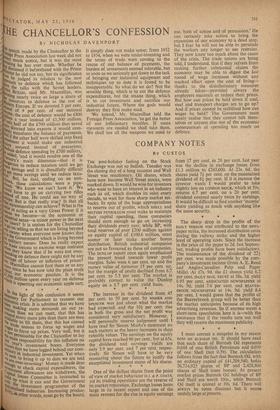HE CHANCELLOR'S CONFESSION
By NICHOLAS DAVENPORT
keel) made by the Chancellor to the fli.lign Press Association last week did not ev-„"cit much notice, but it was the most 1 ad-441:48 he has ever made. Whether he 1,7,41scussed it beforehand with the Prime Lillster he did not say, but its significance D'bL be judged in relation to the new "ef,'"uaeh to defence which has followed n the talks with the Soviet leaders. t Britain, said Mr. Macmillan, was he'r°ting nearly twice as large a share of w; resources to defence as the rest of ie;is:ern Europe. If we devoted 5 per cent. -41 of 9 per cent. of our ntational e11,31e, the cost of defence would be £800 If "°,n a year instead of £1,500 million. wect,r4 half of the £700 million thus saved pit'te directed into exports it would corn- AtIciely transform the balance of payments. 14; if the other half were shifted into fixed fehTtllent it would make our industrial ke"d`e assured instead of precarious. he "lice defence spending by £700 million,' tr;Mded, and it would resolve one of the (144,,surY's main dilemmas—that it is eloro.ernus to reduce taxation until we get to savings and it is dreadfully difficult her More savings until we reduce taxa- he iaid, ending on an anti- dte"',ax, these calculations were a pipe- '0i0„1111. We know we can't have it.' We 1114'd have to go on carrying two rifles tleaead of one. He could see no way of 11P e. But is that really true? Is that all statesmanship can achieve/ What is the fee;` In acting as a very Great Power if it iees we become—in the economic or 14'strial sense—a minor power in the next „ DZears? It is useless for the Chancellor oor on telling us that we are living beyond is Teans when everyone now knows that ily h,`",e Government which is living beyond thetary means. Does he really expect When"arle unions to exercise wage restraint "di theY know that if he were not over- , On defence there might not be any \tr-k;age of labour or inflation of prices? thot.,'"aemillan cannot fool them or us any 40,`„sittue he has now told the plain truth 1,5"(1,' our economic position. It is the 7„rnillion spent every year on defence Upsetting our economic apple cart. atee, e light of this confession it seems ecosary for Parliament to reassess our beei,""rruc crisis. It is admitted that we have soo" making more demands on our re- efea't`es than we can meet, that this has `tvaij,fliany more jobs than there are men the trade Unions fill them, that this has caused \v4, _ ade unions to force up wages and to force up prices. Very well, but it the Permissible for the Chancellor to lay 14%t'aul responsibility for this inflation on khowYear's investment boom. Everyone Detit",,s that we have lagged behind our com- in industrial investment. Yet when , to bring it up to date we are told etto,:e, over-investing! Money is made dear illv`,,gu to check capital expenditures, the ttflellt allowances are withdrawn, the hordial issues Committee is instructed to Nis what it can and the Government rtftfio,."`,",e, investment programmes of the sed industries. Increasing produe- ') 4E1 other words, must go by the board.
It simply does not make sense; from 1952 to 1954, when we were under-investing and the terms of trade were coming to the rescue of our balance of payments, the burden of armaments seemed tolerable, but as soon as we seriously got down to the task of bringing our industrial equipment and techniques up to date it is found to. be insupportable. So what do we do? Not the sensible thing, which is to cut the defence expenditures, but the insane thing, which is to cut investment and sacritice our industrial future. Whom the gods would destroy they first make mad.
'We intend,' Mr. Macmillan told the Foreign Press Association, 'to get the better of our inflationary troubles. If more measures are needed we shall take them. We shall use all the weapons we need to use, both of action and of persuasion.' He can certainly take action to bring the expansion of our economy to a dead stop. but I fear he will not be able to persuade the workers any longer to use restraint. They now know too much about the cause of the crisis. The trade unions are being told, I understand, that if they refrain from making further substantial claims the economy may be able to digest the last round of wage increases without any marked effect upon the cost of living— thanks to the disinflationary measures already taken—provided always the employers maintain or reduce their prices. But how can prices be held down if coal, steel and transport charges are to go up? And if prices cannot be stabilised how can wages be held? The Government must surely realise that they cannot talk them- selves or anyone else out of the economic consequences of spending too much on defence.










































 Previous page
Previous page